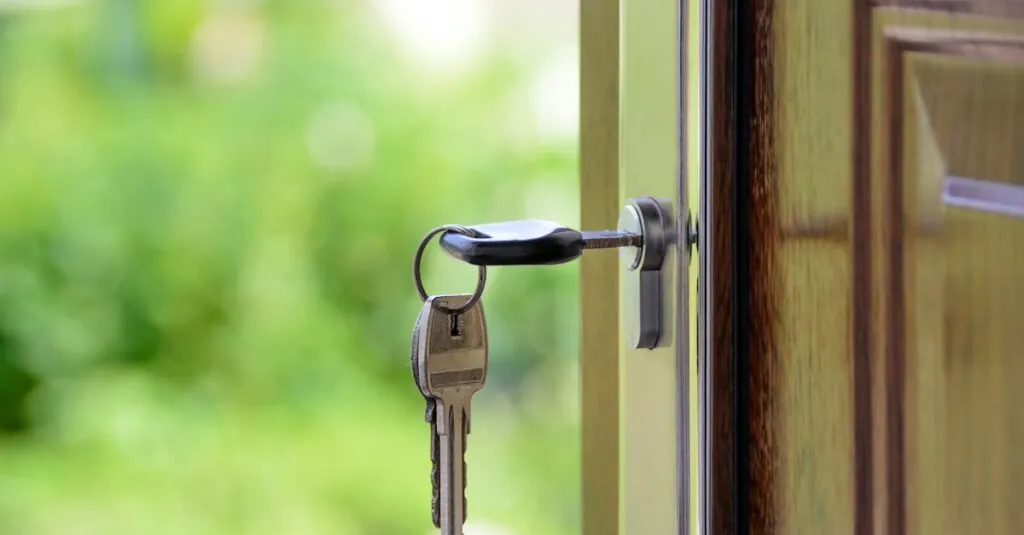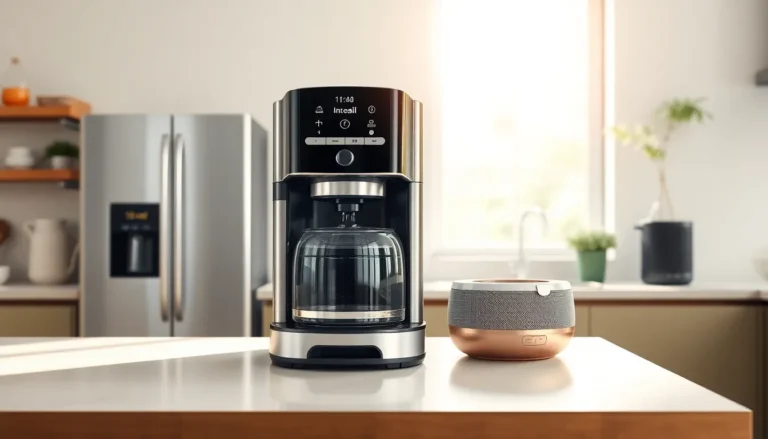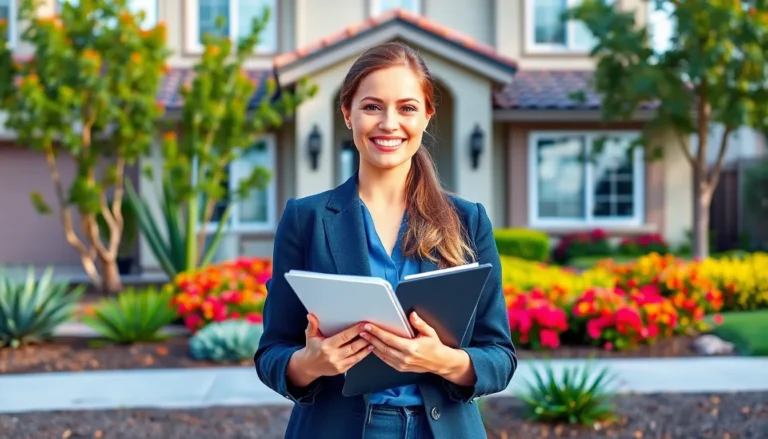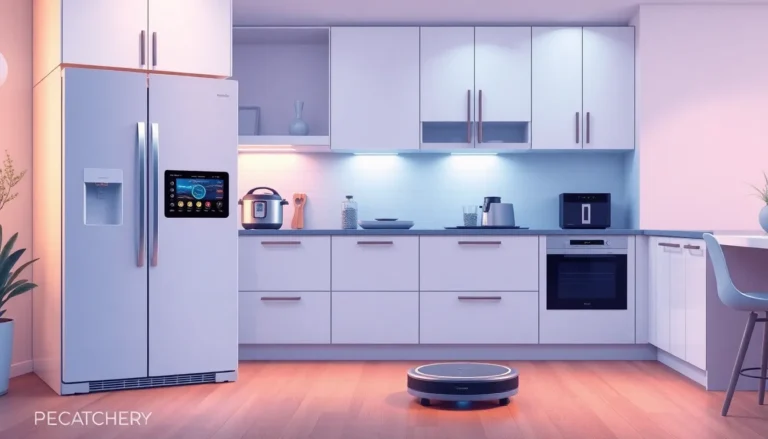Table of Contents
ToggleIn a world where even your toaster might be plotting against you, smart home security systems have become the unsung heroes of modern living. Imagine a home that not only protects your valuables but also keeps an eye on your mischievous cat as it attempts to conquer the kitchen counter. With technology evolving faster than a squirrel on espresso, it’s time to embrace the gadgets that make life safer and a tad more entertaining.
These systems aren’t just about alarms and cameras; they’re like having a virtual bodyguard who never takes a coffee break. From motion sensors that alert you to unexpected visitors (or that pesky raccoon) to smart locks that ensure you’re the only one with the key, smart home security solutions offer peace of mind with a sprinkle of convenience. Get ready to transform your home into a fortress that even the most determined intruders would think twice about.
Overview of Smart Home Security Systems
Smart home security systems integrate advanced technology to enhance home safety. These systems often include elements such as surveillance cameras, motion detectors, and smart locks. Each component contributes to an overall secure environment.
Surveillance cameras offer real-time monitoring, allowing homeowners to keep watch from their smartphones. Motion detectors alert users to any activity, aiding in the prevention of unauthorized access. Smart locks ensure that entry points are secure, providing remote access control.
Numerous systems allow for automation and scheduling. For instance, users can program lights to mimic their presence at home. This feature deters potential intruders who notice activity within the home.
In addition, smart home security systems often include alarms. Alarms emit loud sounds when sensors trigger, immediately alerting nearby individuals and discouraging intruders. Notifications sent directly to users’ smartphones ensure they are informed of any unusual activity, even when away.
Many options support integration with other smart home devices. Compatibility with smart assistants allows for voice control, enhancing convenience. Homeowners can also tie in environmental sensors, providing alerts for factors like smoke or carbon monoxide.
Overall, the selection of smart home security systems enables customization to fit diverse needs. Users can choose features that address their specific security concerns and preferences. Investing in these systems significantly contributes to a safer living environment.
Key Features to Consider
Smart home security systems offer various features that significantly enhance overall protection and convenience. Understanding the key components helps users make informed decisions.
Video Surveillance
Video surveillance acts as a primary layer of security. High-definition cameras provide clear images, enabling users to monitor their property in real-time. Systems often support remote access through mobile apps, allowing for instant viewing from anywhere. Many models include night vision capabilities, ensuring visibility even in low-light conditions. Additionally, cloud storage options enable users to save footage for later review, adding an extra level of security.
Intrusion Detection
Intrusion detection is essential for alerting homeowners to unauthorized access. Motion sensors detect movement and send immediate notifications to mobile devices, ensuring users stay informed. Many systems allow for customizable settings, letting users configure sensitivity levels to reduce false alarms. Some features include window and door sensors that trigger alerts when breached. Integration with other smart devices enhances overall protection, as alarms can sound off and lights can activate when intrusion is detected.
Smart Locks
Smart locks enhance home security through keyless entry. Users can unlock their doors remotely using smartphones, improving convenience for guests or service providers. Many models feature automatic locking mechanisms, ensuring doors remain secure when no one is home. Furthermore, temporary access can be granted to visitors by sharing digital keys, which can be easily revoked. Some smart locks even include monitoring features, allowing users to track who enters and exits their home.
Popular Smart Home Security Systems
Numerous smart home security systems offer enhanced safety and convenience for modern living. Here are three popular options:
System A
Ring provides versatile home security solutions with its range of security cameras and doorbells. Users benefit from high-definition video and two-way audio, allowing real-time communication with visitors. The motion detection feature sends alerts directly to users’ smartphones, ensuring they stay informed of any activity at their doorstep. Integration with smart lighting helps create an illusion of occupancy, further deterring potential intruders. Additionally, users can access recorded footage and adjust settings with ease through the user-friendly Ring app.
System B
Arlo specializes in wireless security cameras, promoting a flexible installation process without sacrificing performance. Its high-resolution cameras come equipped with night vision and advanced motion detection capabilities, making them ideal for both day and night monitoring. Arlo’s system also supports integration with platforms like Amazon Alexa and Google Assistant for voice control. Customizable activity zones focus notifications on specific areas, reducing unnecessary alerts. Through the Arlo app, users can review footage and adjust camera settings conveniently, enhancing their overall security experience.
System C
Nest Secure sets itself apart with its comprehensive security approach and easy integration into existing smart home ecosystems. This system features a range of sensors and door/window detectors that alert users to any breaches. Rapid notifications ensure users are aware immediately of potential security threats. The Nest app allows for monitoring and controlling devices from anywhere, which enhances convenience for homeowners. Additionally, it supports integration with Google Assistant for streamlined voice commands, making home security management seamless and efficient.
Benefits of Smart Home Security Systems
Smart home security systems enhance protection by combining advanced technology with user-friendly features. These systems provide real-time monitoring through surveillance cameras, allowing users to view their properties from anywhere. Motion detectors alert homeowners about unusual activity, quickly notifying them of potential threats.
Convenience also plays a significant role in these systems. Smart locks enable keyless entry and remote access, which simplifies managing access to the home. Programmable automation features, like scheduling lights to turn on or off, create the illusion of occupancy, further deterring intruders.
Integration with other smart devices adds another layer of functionality. Homeowners can use voice commands with smart assistants for hands-free control. Alerts for environmental hazards, such as smoke or carbon monoxide, ensure additional safety measures are in place.
Customization options allow users to tailor security settings to fit their specific needs. Users can adjust sensitivity levels on motion sensors to minimize false alarms. Choosing from various compatible devices enhances the overall security experience.
Cost savings often accompany smart home security systems. Many insurers offer discounts for properties equipped with these systems, reflecting the reduced risk of claims. Families can enjoy peace of mind knowing they have taken proactive measures to safeguard their homes.
Privacy concerns are addressed as well. Encrypted data transmission protects users’ information from unauthorized access. As technology advances, smart home security continues evolving with improved features and capabilities, ensuring greater safety and reassurance for all homeowners.
Potential Drawbacks
Smart home security systems present several potential drawbacks that homeowners should consider. Privacy issues arise as these systems often involve continuous monitoring and data collection. Users may feel uncomfortable knowing that cameras and sensors capture their activities.
Furthermore, costs can be a significant barrier. Initial investment for a comprehensive system, including cameras and smart locks, may exceed budget limitations. Ongoing subscription fees for cloud storage or monitoring services can add up over time, creating financial strain.
Reliability poses another concern. Dependence on internet connectivity can lead to issues during outages. If internet access is lost, functionality of smart features may become severely limited, reducing overall effectiveness.
Technical difficulties can frustrate users. Configuration and integration challenges with existing smart home devices can complicate installation. Many homeowners may require professional assistance to ensure everything functions seamlessly.
Maintenance requirements must also be factored in. Regular firmware updates are essential for security patches. Neglecting these updates can expose systems to vulnerabilities, creating potential security risks.
Moreover, false alarms can create anxiety. Motion detectors may trigger alerts from pets, errant branches, or passing vehicles, leading to unnecessary panic. Users might disable features out of frustration, limiting protection.
Lastly, dependence on technology can be problematic. Users may become overly reliant on automated security measures, which could lead to negligence in practicing basic safety habits. Personal accountability in home security remains crucial in combination with advanced systems.
Smart home security systems offer a modern solution to safety and convenience in today’s world. By integrating advanced technology with user-friendly features, these systems provide comprehensive protection that goes beyond traditional methods. With options for real-time monitoring, smart locks, and automation, homeowners can tailor their security to fit their unique needs.
While there are considerations such as privacy and costs, the benefits often outweigh the drawbacks. As technology continues to evolve, smart home security systems will likely become even more effective and accessible. Investing in these systems not only enhances home security but also brings peace of mind, allowing homeowners to focus on what truly matters.







